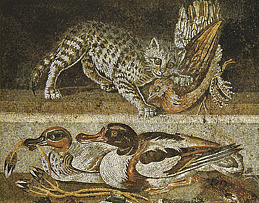Heinrich von Staden to Discuss Experiments on Animals in Ancient Greece and Rome

Heinrich von Staden, Professor in the School of Historical Studies at the Institute for Advanced Study, will give a lecture on “Experiments on Animals in Ancient Greece and Rome: Private and Public Science,” on Friday, May 7, at 6 p.m. in Wolfensohn Hall on the Institute’s campus.
The nature and extent of experimentation in ancient Greek and Roman science remains controversial. In this lecture, von Staden will analyze several experiments conducted on living animals from the fourth century B.C. to the second century A.D. by biologists and physicians, in order to address some of the more controversial issues. He will take a close look at the motivations of the ancient scientists, the purposes of their experiments, their methods, their results and the range of animal species – indigenous and exotic – on which they performed experiments, allowing for a better understanding of the nature of experimentation in antiquity. He will also examine the significant changes over time in the social contexts of experimentation, in particular the bold move from a long tradition of conducting such experiments only in private, before a small circle of students, to performing experiments on animals in public spaces, often before a sizable audience. Finally, he will explore the limits – ethical or otherwise – on animal experimentation in antiquity.
Von Staden joined the Faculty of the Institute in 1998. One of the world’s foremost authorities on ancient science and medicine, his broad range of interests includes classical philosophy and literature. Among his current projects is a book-length work with the provisional title "The Scientific Lives of Animals: Ancient Greece and Rome." His book Herophilus: the Art of Medicine in Early Alexandria (1989) is a prize-winning contribution to the history of Greek intellectual discourse.
Von Staden earned a Ph.D. from Universität Tübingen in 1968. He then served on the faculty of Yale University from 1968 to 1998. He received the William H. Welch Medal from the American Association for History of Medicine in 1993 and the C.J. Goodwin Award from the American Philological Association in the same year. He is a Corresponding Fellow of the British Academy, a Foreign Member of the Finnish Academy of Science and Letters, a Member of the American Philosophical Society, a Foreign Member of the Académie des Inscriptions et Belles Lettres (Institut de France) and a Corresponding Member of the Academy of Arts and Sciences in Göttingen.
For further information about the lecture, which is free and open to the public, please call (609) 734-8175, or visit the Public Events page on the Institute website, www.ias.edu.
About the Institute for Advanced Study
The Institute for Advanced Study is one of the world’s leading centers for theoretical research and intellectual inquiry. The Institute exists to encourage and support curiosity-driven research in the sciences and humanities—the original, often speculative thinking that produces advances in knowledge that change the way we understand the world. Work at the Institute takes place in four Schools: Historical Studies, Mathematics, Natural Sciences and Social Science. It provides for the mentoring of scholars by a permanent Faculty of approximately 30, and it ensures the freedom to undertake research that will make significant contributions in any of the broad range of fields in the sciences and humanities studied at the Institute.
The Institute, founded in 1930, is a private, independent academic institution located in Princeton, New Jersey. Its more than 6,000 former Members hold positions of intellectual and scientific leadership throughout the academic world. Thirty-three Nobel Laureates and 40 out of 56 Fields Medalists, as well as many winners of the Wolf and MacArthur prizes, have been affiliated with the Institute.